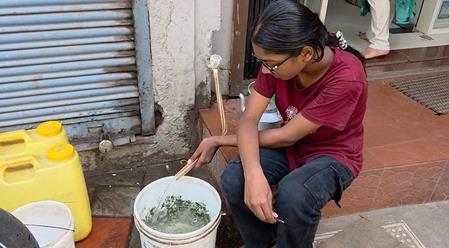
Gujarat: Clean Drinking Water Reaches Vadodara Homes Under 'Har Ghar Nal Se Jal' Scheme
The scheme, launched to ensure a safe and regular water supply, has significantly reduced the water crisis in the city. According to local residents, it has not only improved the distribution system but also contributed to better health outcomes. With access to clean water, waterborne diseases have declined, and households feel more secure about their basic needs being met.
Rajesh Panchal, a beneficiary, expressed his gratitude:“This is a good scheme for the welfare of the people. I want to thank Prime Minister Modi. Earlier, people in Vadodara faced many challenges, but now several problems related to water have been solved. It is said that 90 per cent of diseases are caused by unsafe water, and this initiative has helped reduce them. I sincerely thank the Prime Minister for this.”
Sunil Patel, another beneficiary, recalled how the scheme changed daily life for his family:“We often faced water shortages. Women in our family had to walk long distances to fetch water. Today, because of this scheme, water comes directly to our homes. It has solved a long-standing problem.”
Indrajit Singh Parmar, also a resident, said,“We are getting clean water now. Earlier, we had to buy water from outside, but with this scheme, it is reaching us at home. It is a great relief.”
Since its launch in August 2019, the Jal Jeevan Mission – Har Ghar Jal has been implemented in partnership with states, after subsuming the earlier National Rural Drinking Water Programme (NRDWP). Its goal is to provide potable tap water to every rural household at a service level of 55 litres per capita per day, meeting the prescribed (BIS:10500) quality standards, on a long-term and sustainable basis.
When the mission was announced, only 3.23 crore rural households - about 17 per cent - had tap water connections. As per data reported by states and UTs on August 18, around 12.45 crore additional rural households have since been provided with tap water connections. Today, out of 19.36 crore rural households across 5.86 lakh villages in the country, nearly 15.69 crore households - about 81.02 per cent - have access to tap water.
Further, more than 2.63 lakh villages have been declared 'Har Ghar Jal', meaning every household has functional tap water connections.

Legal Disclaimer:
MENAFN provides the
information “as is” without warranty of any kind. We do not accept
any responsibility or liability for the accuracy, content, images,
videos, licenses, completeness, legality, or reliability of the information
contained in this article. If you have any complaints or copyright
issues related to this article, kindly contact the provider above.

















Comments
No comment